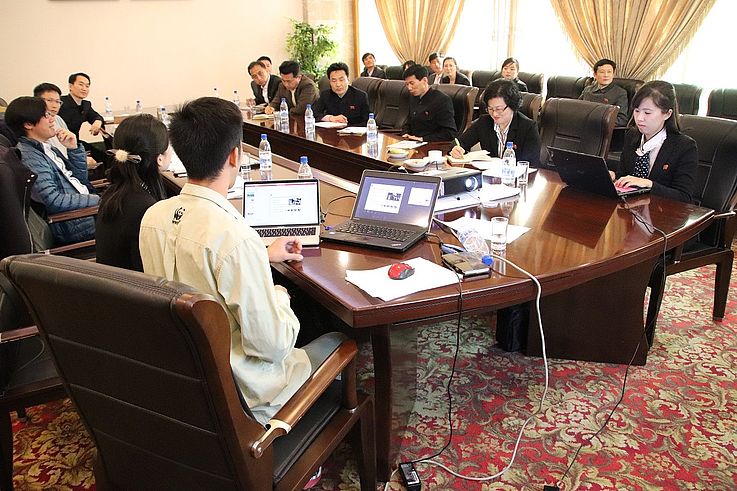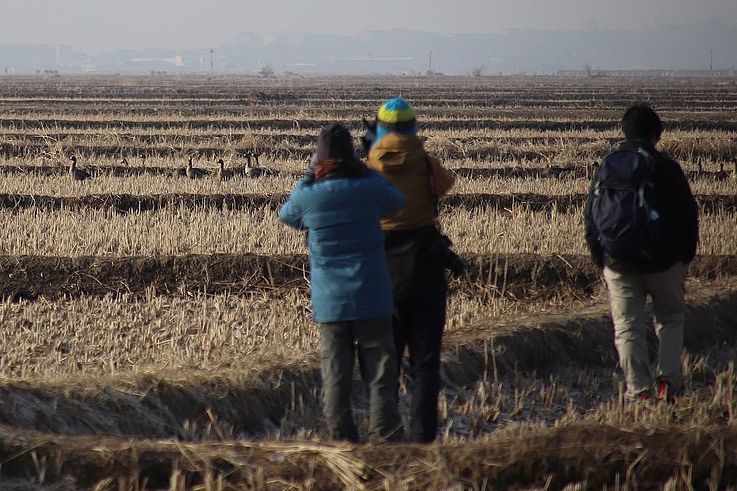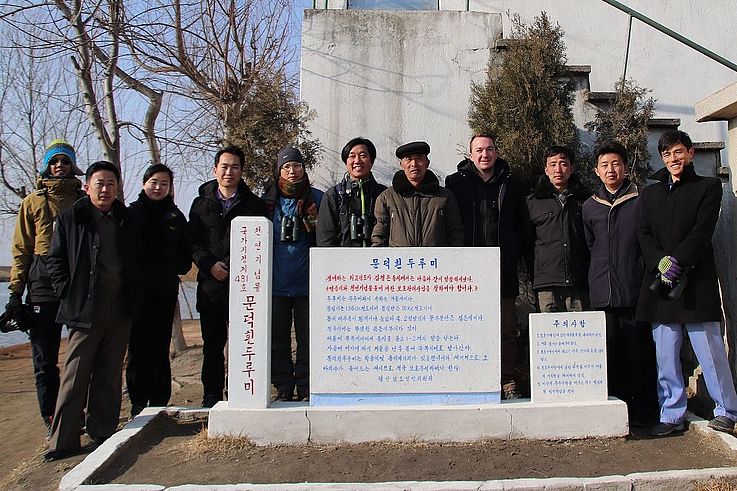Excursion
Raising Awareness on Nature Conservation – Mundok Migratory Bird Reserve
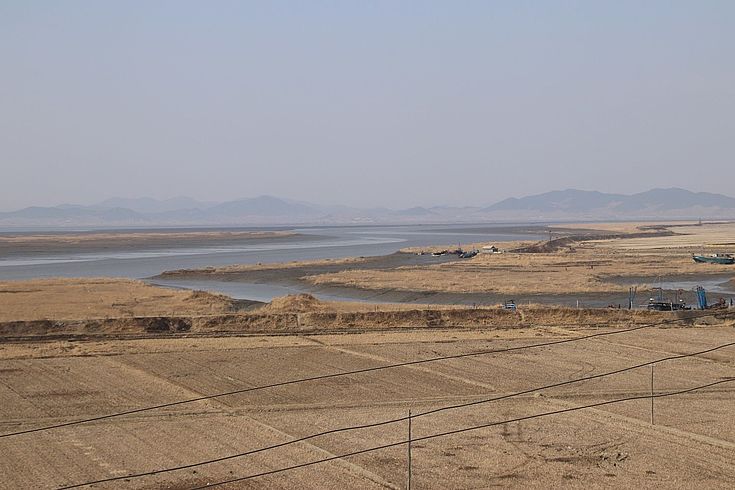
The wetlands of Mundok MBR.
The North Korean intertidal wetlands are of utter importance as it is the preferred habitat of rare migratory bird species such as the Spoon-billed Sandpiper and plays an essential role for a sound ecosystem. Yet, these wetlands have drastically shrunk over the past 50 years which threatens various endangered species. Fortunately, environmental awareness has increased in recent times in North Korea and provoked the government to carry out activities that foster public education and increases awareness for the sake of nature conservation. Within the framework of the United Nations Ramsar Convention on Wetlands, the Mundok Migratory Bird Reserve in North Korea is one of the first two Ramsar Sites of international importance and is officially designated a protected area. However, the reserve still faces challenges that impact the complex biodiversity but may be improved through public education and awareness.
The delegation from Hong Kong that included the WWF Hong Kong, the Hong Kong Bird Watching Society and representatives of the EAAFP secretary, attended a meeting in which North Korean representatives introduced Mundok MBR and presented their efforts to support nature conservation in this area. All participants agreed to take necessary actions to further develop Mundok MBR into a model case for the wise use of wetlands in the DPRK. Apart from education, training and capacity building activities shall be organized where the local population comes together to learn about the importance of the conservation of biodiversity.
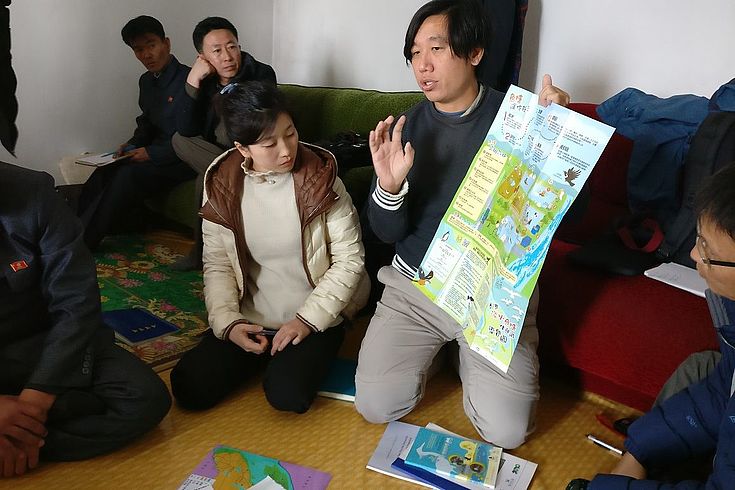
The participants get introduced to Mundok MBR.
The next day the delegation conducted a visit to the Mundok MBR where Mr. O Kyong Chol introduced Mundok MBR's characteristics and site management of which the local Land Management Department of the Mundok District People´s Committee is in charge. The Ramsar Site is 3715 Hectare but may be expanded soon. The area requires profound monitoring over potential threats caused by human activities. Alas, a thorough observation of the biodiversity continues to be a challenge due to lack of equipment and outdated technology. The latest observations assume that the Ramsar Site provides an important resting place for a significant number of Swan Goose every migration period. Nevertheless, insufficient knowledge and expertise about ornithology and biodiversity pose a danger to a proper understanding of the area. This also accounts for the local population as there often occur conflicts amongst the local population regarding biodiversity and development. Hence, a priority must be the harmonization between the lifestyle of the local population and the conservation of Mundok MBR. This goal demands local cooperation and training. During the meeting, WWF Hong Kong and Hong Kong Bird Watching Society could also introduce their work and expressed further effort to increase cooperation.
The following day the delegation from Hong Kong, HSF Korea together with representatives from the National Conservation Union of Korea and the head of the biodiversity center of the State Academy of Sciences attended a workshop on wetland conservation and awareness raising. First, Mr. Ri Song Il explained the national policy regarding environment protection which is supervised by the North Korean Ministry of Land and Environment Protection. Apart from the Ramsar Site management the ministry oversees the implementation and ensures the compliance of environmental laws on central and local levels. Since environment awareness increased, related to continuous educational work, forest and water conservation has become a nation-wide movement. Yet, the North Korean government seeks to increase efforts as Mundok still faces major problems that might be eliminated through effective measures such as the establishment of monitoring teams, learning about bird habitats in the DPRK as well as developing a methodology.
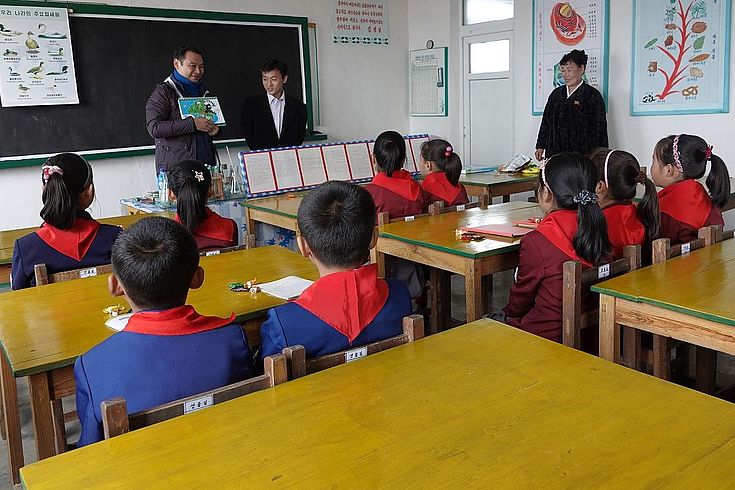
The school class learns more about the importance of wetlands and Mundok MBR.
The following day the workshop focused on strategies for further enhancement of cooperation in the form of joint events and projects such as Sister Partnership Sites along the Flyway, regular meetings and information exchange, etc. In the following discussion about awareness and education regarding nature conservation, the idea was introduced to arrange further training courses and research to foster knowledge exchange. Afterward, the group visited the Tongrim-ri Middle and High School to explore opportunities to directly work with students and identify priorities regarding CEPA (Communication, Education Participation, Awareness) on nature conservation. In the following discussion with the principle and a schoolteacher, both introduced the group to the school's concept which has incorporated nature conservation into their curriculum accompanied by mandatory field visits and nature projects for students. However, they pointed out the need for further educational material and equipment to improve academic teaching.

